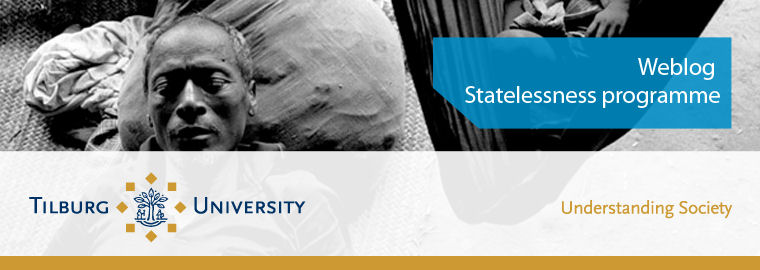I recently had a conversation with Professor Thorsten
Beck from the Department of Economics here at Tilburg. Our conversation lead to
some interesting areas of how microfinance and its relatedness to statelessness.
In this post I
want to explore some of these, specifically how micro-finance schemes could be
a means by which we can start addressing the lack of
income security faced by many stateless people. While work is done on
resolving statelessness through legal reform and naturalization we have to consider
that protracted stateless situations require alternative strategies to overcome
some of the hardships faced by many stateless people while their status is
being resolved. This period of resolution can become significant with some
people living their whole lives without a nationality. Restricted or no access to
financial services, such as bank accounts or loans, has been noted as one of
the major difficulties faced by the stateless. Microfinance institutions (MFIs)
with their alternative banking, credit and insurance services can be, and have
been, designed to overcome some of the barriers and obstacles that are shared
by low income and disenfranchised groups (which includes some stateless).
MFIs are normally associated with the provision of
financial services to low-income individuals as a means to allow them to lift
themselves out of poverty. Despite critique such schemes have received growing
interest over the last several decades and have been shown as one path to
making financial markets work better for the poor. How alternative financial
services could facilitate access for impoverished stateless persons and
communities has however received little attention. I will draw on three areas
where MFIs and related initiatives have been used to assist the poor with
issues that also affect the stateless.
Firstly, the lack of any form of ID is a barrier to
basic financial services such as opening bank accounts, transferring money, and
accessing credit and insurance. The Credit Reference Bureau of Uganda found
that, as no national ID was provided by the government, those who did not hold
drivers licenses, passports or land deeds etc. found access to financial
services problematic. With those holding ID not seen as the poorest members
of the country as their lack of ID reflected their lack of resources (land,
property, ability to earn an income through driving etc), alternative bio-data and
unique numerical ID solutions were found. Other methods such as basing schemes
on community cooperation and trust have also proven useful and could be
implemented for both concentrated stateless populations and those who are
dispersed, but embedded within the local community. Such schemes would avoid the need to formally
register the stateless receiving financial benefits, which is complicated, expensive and/or requires political
will/cooperation.
Secondly, phone
banking has proved popular and successful in Kenya as a means to facilitate
easy, affordable and accessible financial services. For stateless populations
this could mean the easy transfer of money between dispersed families and
communities, remittance facilitation, and transfer of funds to difficult to
reach populations (both physically and politically) from MFIs and non-governmental
organizations. Without access to bank accounts and the problematic nature of
transferring money without ID cards, phone banking could provide a solution.
Finally, the provision of financial services to the
poor, or making these services more accessible, can be seen as an individualized
response. By that I mean that MFIs can circumvent some of the political issues
of providing financial services to stateless populations by basing their
services on need alone. This could manifest itself by providing these services
through international organisations rather than the local government. In
situations where the government refuses these services to the stateless - as
non-citizens - this could be one path to reducing the impact of protracted statelessness
through a measure of income generating schemes. This makes it possible to give real content to the
international commitment to address the fundamental protection needs of
stateless people, while a solution to their situation is found (a process that
can take decades , or generations).
Lack of any form of ID, lack of access to financial
services and the at times politicised nature of government provision of financial
services has been overcome for impoverished communities in countries around the
world. This can, and should, be explored more closely with a view to extracting
relevant good practices that can be extended to the stateless more broadly.
This would not only allow the stateless to lift themselves out of poverty, but
also begin to challenge the assumption that granting or restoring nationality
to stateless populations would be a burden or drain on a state’s resources.
While we still have to consider other barriers that will influence the success
of MFIs for the stateless, such as contexts of deep seated socio-political
discrimination, lack of freedom of movement and lack of economic rights such as
property ownership or access to the formal labour market, we should not forget
the appropriateness of MFIs for the stateless. Economic empowerment could also potentially open new
doors to more comprehensive solutions to statelessness by increasing the
integration and participation of affected individuals and groups within the
wider community. While not wishing to devalue the call for the stateless to be
granted citizenship, we also have to consider that the poverty caused by the
protracted situations of statelessness has to be tackled. MFIs have proven
adaptable to overcome many of the barriers faced by the stateless for other
disenfranchised groups. The discourse of MFIs should include the stateless as
the short, medium and long term development of income sustainability for
impoverished stateless groups is as important as finding a solution to their
statelessness.
The Stateless Programme is going to dig into some of these questions a little further
and we would love to hear from microfinance experts who have information or
insights to share.
Jason Tucker, Visiting Scholar, Statelessness
Programme

No comments:
Post a Comment